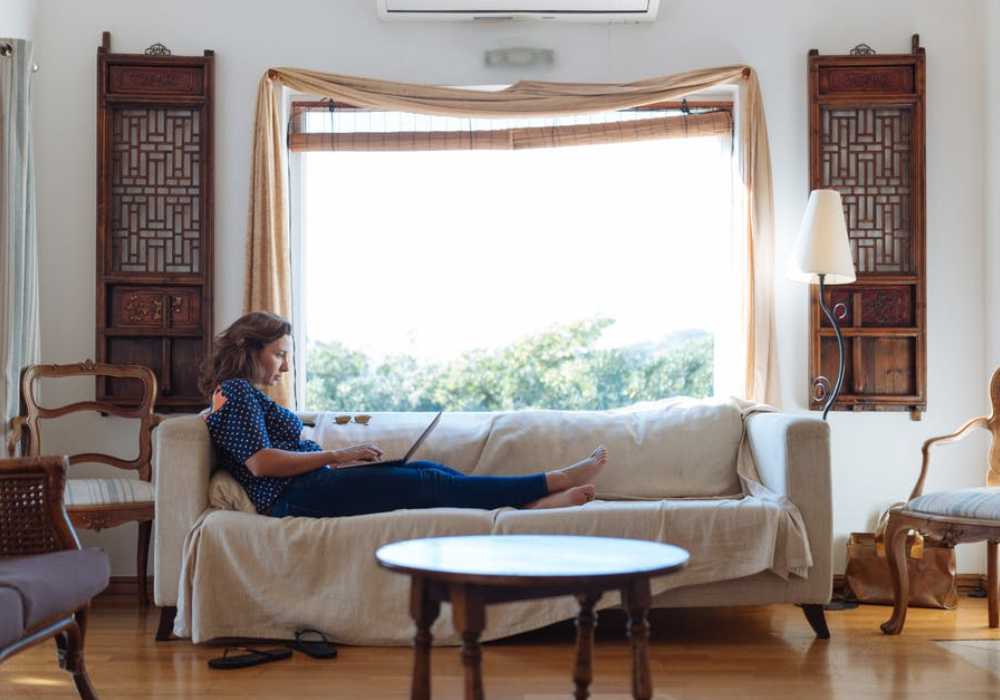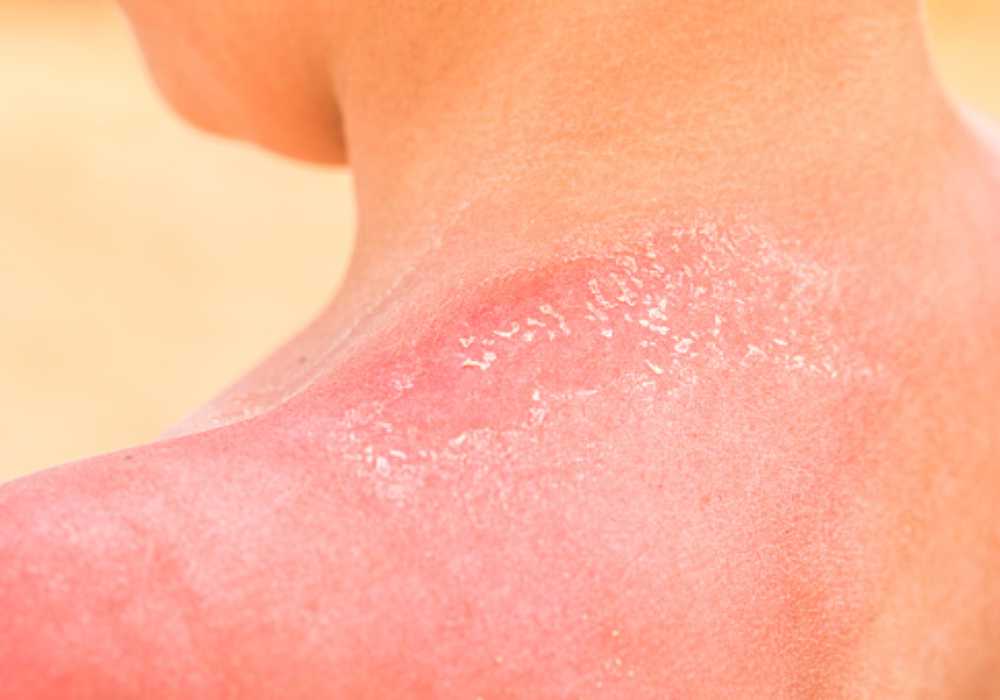As an Affiliate, We may earn a commission that doesn't cost you extra from qualifying purchases using links in this post. It helps keeps this blog running.
Have you ever sat by the window, basking in the sun’s warm glow during the winter while imagining it was summer just hoping to get sun-kissed a little?
A sunny day can uplift your mood even when you seem cold inside. But it’s possible to have too much of what’s good, especially when it comes to the rays from sunlight.
What are the effects of too much sunlight? Can you get sunburn through a window? Read on to learn about them, both the good and the bad. But first;
Read A Specific Section
What Exactly Is A Sunburn?
The sun emits three types of ultraviolet rays; Ultraviolet A, Ultraviolet B, and Ultraviolet C. When you expose your skin to the sun for a long period of time, the ultraviolet rays emitted from the sun affect the skin resulting in a painful-like patch that appears very red and feels hot, itchy, and stinging to the touch. This is called sunburn.
The appearance of it usually occurs after being overexposed to sunlight.
Sunburn usually lasts a few days before it goes away and it often results in skin damage such as black spots, dry skin, and wrinkled skin. It also increases the risk of some types of skin cancers.
Can You Get Sunburn Through A Window?
Yes. you can get sunburnt through a window but not as fast as you would under direct sunlight. This however depends on the type of window and other conditions such as the time of the day and the level of the sun’s intensity.
Ultraviolet rays tend to be very intense around the middle of the day. So, sunburn through a window is more likely to occur when you expose yourself to the sun (on days when the ultraviolet index of the sun is high) for too long. For example, if your office or home windows are left open or closed and not specially laminated, or you sit directly towards the sun or near objects that reflect the sun like a mirror.
Also, ultraviolet rays are known to bounce off certain surfaces such as concrete, painted walls, and even water left in a glass cup or bowl, which increases your exposure thereby resulting in sunburns.
Basically, the longer you sit by the window or a reflective object on a sunny day, the more likely you are to have a sunburn.
Benefits Of Sunlight Through Windows
We’ve discussed the relationship of sunlight through windows with sunburns but are there any benefits of getting sunlight through a window?
The answer is not just yes, but “A LOT”. So, let’s see;
1) Better Sleep
Getting a good night’s sleep is not always easy, first, the day’s stress and sometimes, the state in which your body is. Also, factors like the time of the year can affect your sleep.
Waking up from the sunlight coming in through your window can naturally help keep your body in rhythm which can, in turn, result in better sleep at night.
2) Boosts Your Alertness
The natural sunlight that comes in through your window also boosts the level of your alertness and makes you much more aware of your environment and surroundings.
This helps you make more logical decisions and boost your productivity.
3) Improved Agility
You feel less sluggish or tired and you’re very motivated to get to your work for the day as a result of an immense absorption of a healthy amount of sunlight.
The sunlight that flows in through your window can help you start the day on a good note so that you can properly concentrate on the work ahead of you and get your things done.
4) Relieves Stress
The sunlight coming in through your window can most of the time have a soothing, relaxing, and calming effect. Everyone needs a break from time to time and one of the best ways to observe this break is to get a good amount of fresh air and window sunlight.
Naturally, the sunlight we get to feel by the window side makes us feel less stressed and more relaxed. So, it’s easy to focus on the natural environment and exhale stress.
5) Good Source Of Vitamin D
Lack of vitamin D can lead to weakness of the muscles, depression, pain, and tiredness. This however can all be prevented just by sitting by the window for a few minutes in the sunlight.
Vitamin D is an important part of all the nutrients our health needs. Taking in sunlight through the window exposes your skin and enables your body’s cholesterol to make vitamin D. It also helps to regulate the level of calcium and phosphate present in the body, which is needed to keep the muscles healthy, and the bones, and teeth strengthened.
Is Sunlight Through A Window Harmful?
Yes, sunlight through a window can be harmful, although minimal. We’ve discussed the positivity of sunlight through the window, but how about the negative aspect?
Sunlight is made up of three types of ultraviolet rays that reach the earth, ultraviolet A rays, Ultraviolet B rays, and ultraviolet C rays. Too much exposure to any of these will cause harm and damage the skin, and worse, skin cancer. They can also prematurely age your skin, and cause wrinkles, dark spots, and even sunburns.
Sunlight UV rays are existent during all daylight hours and in the winter. Although window sunlight can reduce the intensity, overexposure can be harmful. Furthermore, it is advisable to not sit too close to the window but instead, about five steps away.
Here’s How You Can Get Sun Damaged Indoors
You might wonder since you are indoors and not outside directly in the sun, you are safe from the damage of the sun, but that’s not it. Unless your home/office window glasses are made of a special material that completely blocks out UV rays, then the rays of the sun can still penetrate and find their way in. This is especially true if the sun rises over an open window, or your home or office windows are made of single-pane glass.
But it’s not just indirectly through the window glasses, there are other items like mirrors, stainless cups, and plates, water, tiles amongst others that can reflect sun rays to your skin, and when rays bounce off through these objects straight to your skin for a long time without notice, you might experience sun damage.
Does A Window Prevent Sunburn?
Yes, but only to a very little extent. First, it depends on the type of window, and second, the amount of time spent by the window while exposing yourself to the sun’s rays.
Typical windows tend to block out most ultraviolet B rays but only very few ultraviolet A rays. Also, some types of ordinary glasses sometimes come with a UV filter and can tune down the effect of the sun’s damage through the window.
For cars, windshields that are made from laminated glass can filter out more ultraviolet light than side windows. This is because side windows are mostly manufactured from tempered glass.
A window is more likely to prevent sunburn if it’s thick and coated. Also, other factors such as the time of the day and the intensity of the sun have their effect.
Windows are more likely to prevent sunburns if you sit away from the direction and reflection of the sun, especially at midday.
Can You Get Vitamin D Through A Window?
Hardly any. This is because vitamin D is mostly made when your skin is exposed to ultraviolet B rays. And if your windows block out these rays, there’s no way you would be getting vitamin D sitting by the window side.
The best way to get vitamin D from sunshine is by exposing your skin to direct sunlight. This way, your skin can absorb ultraviolet B rays and convert the cholesterol in your skin to vitamin D.
Also, if you have darker skin, the amount of time taken to convert the cholesterol in your skin to vitamin D will be much more than for someone with a lighter skin type. This is a result of the melanin present in darker skin that reduces the number of ultraviolet B rays absorbed by the skin. Therefore, sitting by the window won’t help much for vitamin D if you’re dark-skinned.
Can You Get Sunburned Through A Car Window?
No, you can’t. It is very unlikely for you to get sunburned through a car window. Although the rays from the sun can still damage your skin by causing other skin issues.
All automobiles have their windshields laminated. This protects you from both ultraviolet A rays and ultraviolet B rays when you’re in the car.

However, the rear and sides of the car windows are made out of tempered glass and do not safeguard against these ultraviolet rays. These rays are known to penetrate the skin and cause issues such as skin aging and skin cancer.
So, while getting sunburned in a car is highly unlikely, you can get long-term skin damage such as cancer.
Can You Get Sunburned In The Shade?
Yes, you can get sunburned in the shade. Although sitting in the shade will help in the reduction of your exposure to direct sunlight, it does not always fully protect you. This is because although the sun might not be able to reach you directly, the ultraviolet rays from the sun can still bounce off objects around you and affect your skin.
The level of protection you obtain from sitting in the shade also depends on the type of coverage provided by the structure.
Another factor that you need to consider when checking for how much of a risk you’re exposed to for sunburns when in a shade is the position of the sun. This is because the angle of the sun changes with time. So an area that provides good shade in the noon might not provide the same amount of shade in the evenings.
So if you ask me, I’ll say you can get sunburned in the shade. Yes, sitting in the shade can help reduce your risks but it can’t completely offer you the protection you need.
Can You Get Sunburnt Through A Double Glazing Glass Window?
A double-glazing glass window acts more like sunscreen or the ozone layer by blocking out most of the harmful UV rays from the sun. Although most, not all.
Although some UV rays are still able to get through, they are the least harmful type of UV rays and you can only get sunburned after a long period of excessive exposure.
How To Avoid Sunburns Through Windows Indoors
Use Protective Windows
You need to understand that some windows are much more protective. For example, windows made out of laminated glass mean that there is a specialized layer of plastic between the two glass layers. The work of this plastic is that the glass is enabled to stretch and break 59 degrees, completely blocking ultraviolet A and ultraviolet B rays up to about 94% percent.
This means that you do not need to worry about getting sunburned if your window glass is sort of a car windshield-type laminated.
Some other windows however are made from tempered glass. This type of glass does not have any plastic layer. Tempered glass is only able to block ultraviolet rays from the sun by about 44%.
Windows at home are not usually completely protective. So, it is more advisable to position yourself some steps away from the window if you must take in sunlight.
Use Sunscreens
If you find yourself spending much time in front of a window at work or even at home, you should always use sunscreen to protect yourself and minimize exposure. Sunscreens protect your skin against ultraviolet A and ultraviolet B rays.
Usually, it is better to use a mineral-based sunscreen that includes zinc oxide with an SPF of about 30. Chemical sunscreens are usually not recommended because they can irritate your skin.
In Essence
Sunburn can occur through various processes. You must learn to protect yourself all around either during the winter or just sitting in the summer shade.

I’m Akin, your dedicated Editor-in-Chief and a fervent skincare enthusiast. Self-care is my true passion, and each year, I embark on a thorough exploration of self-tanning products, ranging from lotions to mists. This forms the bedrock of our commitment to delivering top-notch information to our readers. My extensive research and precise product rankings empower you to make informed decisions tailored to your specific skincare needs.
Unlock the Secrets to Achieving Your Ideal Tan with This Comprehensive Checklist



